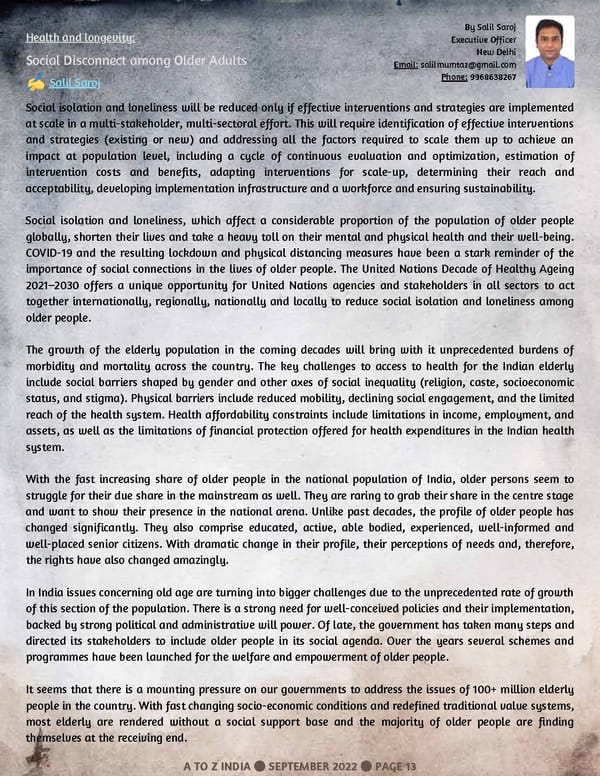Social isolation and loneliness will be reduced only if effective interventions and strategies are implemented at scale in a multi-stakeholder, multi-sectoral effort. This will require identification of effective interventions and strategies (existing or new) and addressing all the factors required to scale them up to achieve an impact at population level, including a cycle of continuous evaluation an d optimization, estimation of intervention costs and benefits, adapting interventions for scale-up, determining their reach and acceptability, developing implementation infrastructure and a workforce and ensuring sustainability. Social isolation and loneliness, which affect a considerable proportion of the population of older people globally, shorten their lives and take a heavy toll on their mental a nd physical health and their well-being. COVID-19 and the resulting lockdown and physical distancing measures have been a stark reminder of the importance of social connections in the lives of older people. The United Nations Decade of Healthy Ageing 2021–2030 offers a unique opportunity for United Nations agencies and stakeholders in all sectors to act together internationally, regionally, nationally and locally to reduce social isolation and loneliness among older people. The growth of the elderly population in the coming decades will bring with it unprecedented burdens of morbidity and mortality across the country. The key challenges to access to health for the Indian elderly include social barriers shaped by gender and other axes of social inequality (religion, caste, socioeconomic status, and st igma). Physical barriers include reduced mobility, declining social engagement, and the limited reach of the health system. Health affordability constraints include limitations in income, employment, and assets, as well as the limitations of financial protection offered for health expenditures in the Indian health system. With the fast increasing share of older people in the national population of In dia, older persons seem to struggle for their due share in the mainstream as well. They are raring to grab their share in the centre stage and want to show their presence in the national arena. Unlike past decades, the profile of older people has changed significantly. They also comprise educated, active, able bodied, experienced, well-informed and well-placed senior citizens. With dramatic change in their profile, their perceptions of needs and, therefore, the rights have also changed amazingly. In India issues concerning old age are turning into bigger challenges due to the unprecedented rate of growth of this section of the population. There is a strong need for well-conceived policies and their implementation, backed by strong political and administrative will power. Of late, the government h as taken many steps and directed its stakeholders to include older people in its social agenda. Over the years several schemes and programmes have been launched for the welfare and empowerment of older people. It seems that there is a mounting pressure on our governments to address the issues of 100+ million elderly people in the country. With fast changing socio-economic conditions and redefined tra ditional value systems, most elderly are rendered without a social support base and the majority of older people are finding themselves at the receiving end. Salil Saroj Social Disconnect among Older Adults Health and longevity: A TO Z INDIA SEPTEMBER 2022 PAGE 13 By Salil Saroj Executive O fficer New Delhi Em ail: salilm um taz@ gm ail.com Phone: 9968638267
 A TO Z INDIA - SEPTEMBER 2022 Page 12 Page 14
A TO Z INDIA - SEPTEMBER 2022 Page 12 Page 14